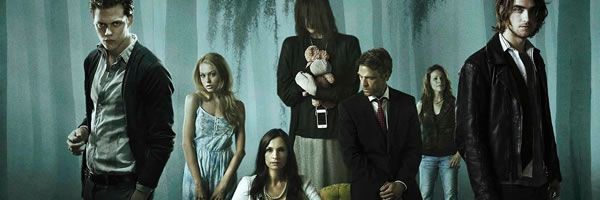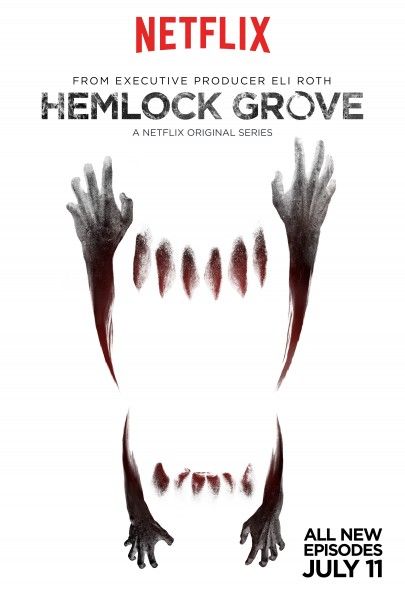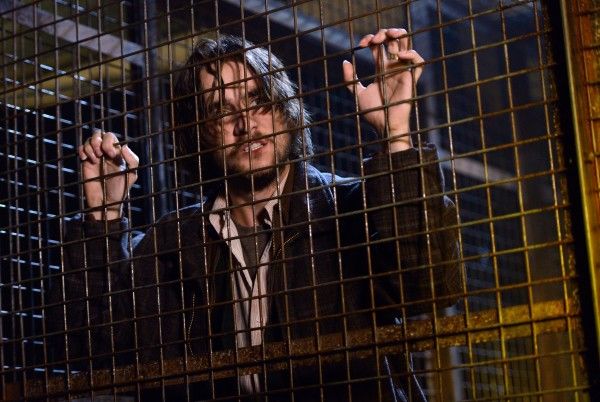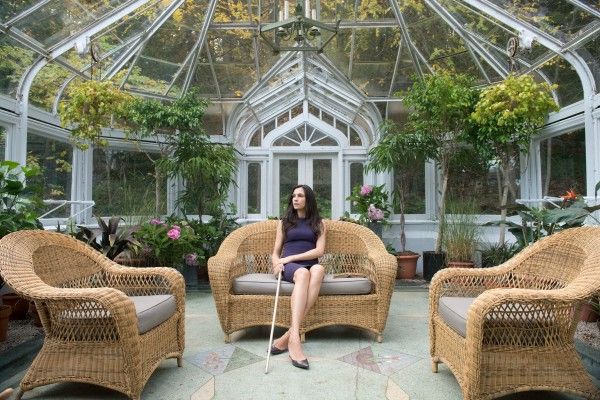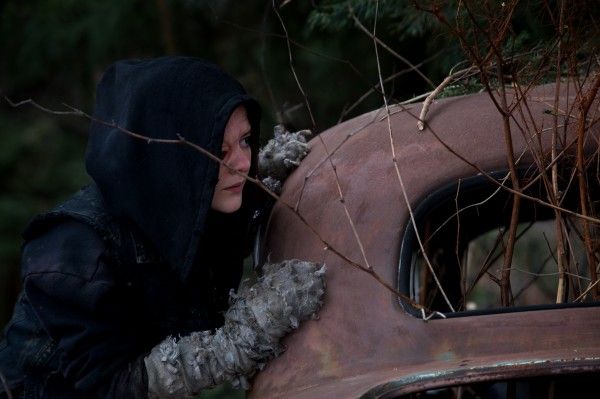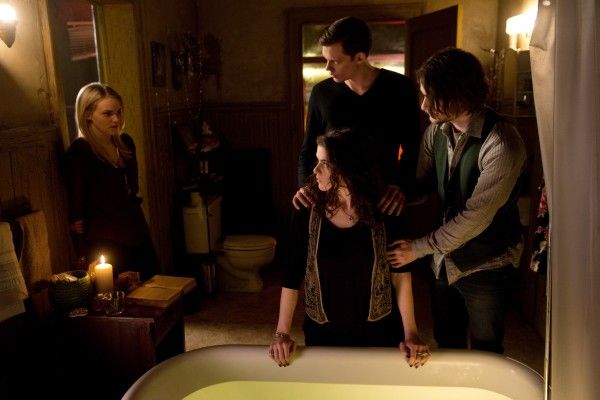Now available on Netflix is the complete second season of Hemlock Grove. Bigger and bloodier than the first, Hemlock Grove Season 2 expands the scope of the show and introduces an insidious "big bad" to challenge the Godfreys and Rumancecks anew. At recent Los Angeles press day I spoke with new showrunner Chic Eglee. He talked about taking the helm for season two, why he was attracted to the show, how the Netflix distribution model affects the way they tell stories, the freedom of working with Netflix, his day to day involvement on set, and more. Check out what he had to say about after the jump.
If you look back at your resume you clearly have an eye for darker material, which this definitely falls into, but what was it about Hemlock Grove that made you want to jump on board?
CHIC EGLEE: I would say there's kind of a list of cofactors. Visually, when I watched the show it was just so beautifully produced, and richly evocative, and moody and dangerous and beautiful at the same time. The lighting had a kind of hauntedness to it - even in the daylight. So it was just such a beautifully exotic world. It's just this far out of time and space. And then the way Drew Boughten, the production designer, created this elegant, rich world. You just kind of want to be in it. So there was that. Then the actors, the cast. What wonderful actors. I've been a fan of Famke [Janssen]'s for along time and Dougray [ Scott], been watching his work, and just a remarkable actor. Bill [Skarsgard] and Landon [Liboiron] were new to me, but just again, so good and so fresh at such an early part of their career. I've been spoiled because I've had the opportunity to work with people in the beginning of their careers whether it's Jessica Alba, Seth Green or Love Hewitt, or whatever, and I had the same sort of feeling of excitement of new actors who are going to be stars with those guys. The characters were I think beautifully drawn.
So creatively there's that and then on the other side of things, having begun my career in free network broadcast universe and moving through the basic cable, making The Shield, and through that sort of methodology of story telling, it seemed a fitting third act to my career that working with Netflix, which clearly is the way of the future. Having the opportunity to tell stories in new media - and I don’t think we've even begun to understand how telling stories in new media is going to shape the content. To be part of that, and certainly to be part of the Netflix culture, was just really appealing. The good news is I seem to have been right on all counts. It's a beautiful show to produce, the actors are more gifted than I imagined, and our colleagues and partners over at Netflix are just the best. Aces.
I was on the set visit up in Toronto.
EGLEE: Oh, you were? Did I meet you?
Kind of, you met me in the room with all the other reporters.
EGLEE: I remember the room. That was my first experience with the blogosphere.
I hope it was good.
EGLEE: Yeah, just seeing "Oh gosh, they're really people behind all this!" Yeah, it was really good.
You mentioned that one of the great things about working with the Netflix format is that narratively you don't have to constantly repeat what's happened, what's happening, and what will happen.
EGLEE: Yeah.
What are some of the other ways that the format has influenced the way you're telling stories with Hemlock Grove?
EGLEE: Well first of all, there is that issue of having a literate audience that's up to speed. It's an appointment with television and they're keeping the appointment because of the way they're consuming the content. Binge watching is just really a furtherance of the "I'll buy the box set" mentality, which is what I was doing. Working in TV I’d get home and the last thing I'd want to do late at night is sit down and watch Breaking Bad or whatever, so I'd wait for a box set to come out and watch at that point. So your audience is consuming content in a very dense way. I think that allows you to write to that. Actually somebody today offered an opposite view that because our show was so dense, they felt that after a few hours of it they needed to take a break because there was so much disturbing stuff. That was interesting. I hadn't thought of that before. The most obvious, again, dealing with an extremely literate audience. You're dealing with an audience who has an ability to stop a show, rewind it, and watch again and really decipher. So we take that very seriously knowing that our work is going to be intensely supervised, whether it's visual effects and people are stopping and looking frame by frame going, "how do they do that?" So we want to make sure that we're doing our very best there. How much of the show have you seen?
I've seen the first six episodes.
EGLEE: So you're aware of the dreams. As that dream storyline begins to expand, I put one writer Peter Blake, in charge of just the dream mythology, the dream wrangling. Because I wanted to think of it as a whole with a beginning middle and end, making sure that the iconography was consistent and that the mythology was building and enlarging. Because I knew that people were going to be stopping and going back, looking at the last episode again and thinking, "Well how does that sync up with this?" Already there was somebody - Did you notice some snakes in the dreams?
Yeah, not specifically, but there was a lot of imagery flashing by.
EGLEE: I showed this to somebody up in Canada who was new to the show and I just wanted to get a reality check, so I showed it to her. She's an art student and she said, "I love the snake imagery with the forked tongue, because it replicated Olivia's tongue having been ripped out." Of course, I wasn't even thinking that. So you're dealing with people who are really looking at symbolism and trying to parse and decipher it. So again, an audience given to close scrutiny.
Then just how people watch TV. When I was starting out I worked on a show called St. Elsewhere, Bruce Paltrow was the executive producer of that, and I turned in a script. In the first page something happened, something sort of jarring and he said to me, "No, you don’t want to do that, because somebody's getting home, they just put the kids to bed, they're settling down in front of the TV, they're getting popcorn, they're fluffing pillows. You don't hit them in the face with a frying pan in the first scene." He was obviously talking about how people were consuming their content at home. Well, I know that what's happening is that people are walking in to a room, they're closing the shutters, turning off the lights and taking the phone of the hook, and they're going to be there for a few hours. They're going to watch it and they're ready for the ride. They're strapped in and ready to roll. It's like, "Give it to me baby!" I think the viewers attitude that they're bringing shapes the content and how we render the content.
Then lastly, the difference between broadcast TV, cable and some of the premium television like Netflix is we're unconstrained by the FCC, so we don't have to worry standards and practices, language, we don’t have to worry about offending somebody's sensibility. "Oh, you can’t say that because it's ad supported. Johnson & Johnson doesn't want to get letters because you've taken the lord's name in vain." Or something like that. So we don't have that onus on us. And that, by the way, is a moving target and endlessly frustrating. Even in cable, anything that's ad supported, you get these notes back. And it changes on a daily basis what word offends this person that doesn’t offend that person. You end up sort of negotiating language. So all that energy is going into diplomacy instead of just making the show better. I remember on The Shield Vick Mackey was talking about a female cop in a dirty situation, and he said to here that she was up to her twat in shit. So we got the word back from the network that you couldn't say "twat", which we were able to say the previous season, but something had happened. You can't say twat. So I changed it something infinitely worse, I changed to "she's up to her manhole", which is so much more graphic and horrible.
[Laughs] Definitely conjures more imagery.
EGLEE: You just don't have to worry about the bureaucracy of language and stuff like that, which is enormously freeing. My rule there when dealing with standards and practices, was always to be subversive. If they're going to make me change something, I'm going to make it even worse than what it was. Kurt Sutter is the same way, by the way. We'll make them pay. We don't have to do any of that.
And really, to sort of end that line of questioning. Marshall McLuhan is right, the medium does shape the content and I don't think we even know how new media is going to impact the content. I'm anxious to find out and to learn.
Tell me a bit about your day to day involvement was on this. How much were you on the set? What kind of notes did you provide? What were the elements that you really brought in for this new season?
EGLEE: This is the fourth show I've done that was shot at a distant location and it's never ideal. Every time that happens there ends up being a sort of neo-colonialist mentality of you know, on the set its like them back there. It's like being on a plantation and going, "Well London says..." You're the East India Company. Because you can't be there, there's a lot of opportunity for miscommunication. First and foremost my responsibility is to make sure the scripts are good and to be in the writers room. That means that I'm there breaking all the stories with the other writers and I'm there reading and giving notes. Usually in my universe I take a pass at all the scripts as well, just to make a consistent voice through it.
So the early part of the season I was up there for less than I wanted to be and less than I should have been - new show, new actors that didn’t know me. I wish I had been there more. Once I knew that we were okay script wise and were in good shape, I went up there and I stayed full time. I would have been up there earlier, but my wife got very ill so I stayed here longer than I anticipated to make sure she was ok. Then I moved up there for the last third of the season and was involved in all the production of it. Then I was heavily involved in post-production of all the episodes in the editing room for all of it. Because by my lights, the editing room is sort of your last chance to re-write the episode. The editing room, for me, is a writing function as much as anything else. In a perfect world we would be writing and producing the show in the same place so I could walk down to the stage and watch rehearsal and come back up to the writers room. It wasn't ideal, but it worked and I'm proud of the results.

